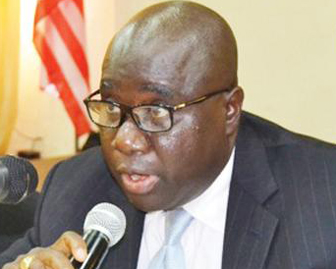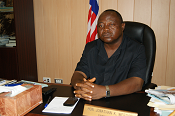Liberia October 10, 2017 Elections May Be Undermined By A Flawed Voters Registration Process And Unreliable Voters Roll
By John H.T. Stewart Jr
Contributing Writer
The Perspective
Atlanta, Georgia
August 4, 2017
 |
|---|
| NEC Chairman Jerome Korkoyah |
This piece is intended as a wake-up call to all civil society leaders including religious leaders, political leaders and aspirants in the upcoming elections to look ahead to see the immense potential danger that awaits us as a nation if we do not correct the huge mistakes made in the Voters Registration exercise that have now produced a non-credible and highly unreliable Voters roll.
The National Elections Commission (NEC) has yet to publish a final Voters Roll although it is now four months since the completion of the Voters Registration (VR) exercise and sixty-eight(68) days to elections. But the National Elections Commission (NEC), has gone ahead anyway and declared campaign open, regardless of the fact that the initial Voters Roll published by the NEC for public vetting was shown to be replete with omissions of names that ran into the thousands.
NEC Chairman, Jerome Korkoya, when appearing under oath before the Senate in last June, declared under oath that the total number of omissions amounted to 13,000 and by his reckoning, the figure was infinitesimal and was therefore nothing to worry about. But all the available facts proved otherwise. In just Grand Cape Mount County alone, for example, 12,000 omissions were reported, while in Maryland County over 5,000 omissions were reported.
Since then NEC officials have been making frantic efforts to correct the situation. For instance, all the Elections Magistrates from the fifteen counties were, according to NEC insider sources, summoned to NEC head office in Monrovia to, as sources put it, manipulate the figures to reflect a different picture. But trying as hard as they possibly can the figures yet appear irreconcilable. Thus, NEC has resorted to publishing a final list that does not include Voters profile which makes it impossible to establish its reliability and credibility.
And so, the question is whether can the country go through elections in the absence of a credible Voters Roll. Certainly, not in the opinion of Jonathan Weedor, the longest serving and clearly the most knowledgeable and experienced Elections Commissioner among the lot. In a Press statement dated 15th June 2017, Commissioner Weedor expressed open disagreement with Chairman Korkoya’s position that in view of the situation anyone showing up with a Voters registration card will be allowed to vote whether the individual’s name is included on the final Voters roll or not.
 |
|---|
| Jonathan K. Weedor Commissioner, NEC |
Commissioner Weedor writes “In fact the essence of every Voters registration exercise is to establish a voters roll that can account for every eligible voter who participated in the voters registration exercise. And so, the relevance of a reliable voters’ roll in any electoral exercise cannot be overemphasized because the absence of said roll is an open gate to fraud. Hence any action or pronouncement that that has the potential to understate the relevance of a reliable Voters roll must be discouraged because said endeavor is a recipe for chaos”.
Commissioner Weedor further stated with emphasis that the essence of a Voters roll exhibition is to ensure that individuals who participated in the Voters registration exercise be provided the opportunity to vet the Voters roll to establish its reliability and credibility. He maintained that Chairman Korkoya’s declaration before the Senate was unilateral and did not reflect the view of the Commission because at no time, to the best of his recollection, was any plenary of the Board of Commissioners held to reach a decision of such magnitude and which did not reflect the truth.
Per information posted by NEC earlier during the week there are only 70 days left to the conduct of the elections scheduled for October 10, 2017. As electioneering has now commenced, the sheer multiplicity of contesting parties, twenty-two at latest count, suggests that problems likely to arise from elections conducted without a credible and reliable Voters roll will be huge and just as numerous as the candidates competing at all levels.
For example, any losing candidate could claim “fraud” and point to an unreliable Voters Roll produced by a flawed Voters Registration process and go to court. The case could linger in the Supreme Court for ages just as the disputes from the 2014 elections lingered before the Supreme Court which were finally disposed of three years later in 2017.
Such a development could lead to virtual paralysis and provoke violent reactions especially from those individuals with the resolve and financial wherewithal why because everyone would be in their right to contest the results based on faulty Voter registration and an unreliable and non-credible Voters roll. It is like starting a fire and waiting to see what will burn!
Insider NEC sources say that Political parties, in a meeting held recently with President Sirleaf, have pledged to fully cooperate with the NEC through every step of the process. But whether such cooperation means that Political parties are expected to maintain their silence in the face of a non-credible Voters roll which could have adverse implications for national security and stability as well for the candidacies of contestants remains to be seen.
In fact, it would be sheer naivete on the part of anyone to suggest the elections will be problem free drawing on lessons learnt from the 2014 Special Senatorial elections, the aftermath of which saw an unprecedented number of elections disputes going to the Supreme Court. Some of those cases lingered in the Supreme Court for more than two years before they were finally adjudicated.
And in the wake of recent rulings by the Supreme Court, declaring in one instance that a candidate had violated terms of the Code of Conduct while in another, but similar instance, purged others and declared them eligible to contest has raised a serious issue of public concern-that is the growing lack of public trust in the ability of the Supreme Court to deliver unadulterated justice to the Liberian people. And such lack of trust could be a key determinant factor in the potential outbreak of post-electoral violence.
Why because lessons learnt from the violence of the 1985 immediate post-electoral period should prove instructive. With so many candidates competing for so few posts the likelihood that some defeated candidates will cry foul is certain and the nation’s Supreme Court may once again find itself put to test. In the case of the 1985 elections, several Presidential candidates including the incumbent claimed victory.
But military strong-man and dictator Samuel Doe’s five-year iron fisted rule had effectively stymied the rule of law, intimidated an already corrupt judiciary and coerced a seasoned and servile opportunist into declaring that the stolen elections results were as he put it, “ordained by God”. This of course created a huge residual undercurrent of public discontent because, by all accounts in the perception of the public, the results had been stolen and there was virtually no recourse to redress by way of the law.
And with several Presidential candidates claiming victory including the incumbent the stage was now set for confusion. And apparently because the Supreme Court could not be trusted or because it had lost faith with the Liberian people, people (political parties and candidates) acted otherwise. Some chose to accept their seats or reject same. Current President Sirleaf then a Senatorial candidate chose to reject the seat she won on grounds that the results were grossly rigged in Doe’s favor.
But Presidential candidates Gabriel Kpolleh and Jackson Doe, out of fear for their lives and through outright intimidation conceded defeat. Only a month later, on November 12, 1985 a botched military invasion was launched and a spate of bloody reprisals followed in its wake and thus begun the country’s precipitous slide into fourteen years of violence and anarchy.
It required the military intervention of ECOWAS to bring it to an end while the rest of the world including even our oldest and traditional ally, the United States, watched with bemused interest as its flotilla of ships, soldiers and aircraft anchored just off shore.
To conclude, these forthcoming elections are imperiled and if urgent corrective measures are not taken, we all might as well kiss the twelve years of peace goodbye. As a nation, we cannot afford to lose sight of the fact that individuals contesting these upcoming elections include a host of unsavory characters amongst them, zogos, scumbags, former warlords, former gunrunners, former Generals and foot-soldiers of former warring factions. And we cannot pretend either that they lack the means or resolve to foment trouble should they see their interests threatened by what they perceive as a lack of transparency.
We cannot therefore overemphasize the need for a reliable and credible Voters roll to ensure transparency. Current efforts underway by the NEC to clean up the rolls are not yielding the desired results and the sooner the NEC leadership realizes this the better. The credibility of the Voters roll needs to be restored as urgently as possible and this can only be done with a re-run of the Voters registration exercise.
Invariably this shall require some adjustments in the electoral schedule which includes the shifting of the October elections date to a future date preferably sometime in November. As indicated in a previous article, the intervention of ECOWAS in this matter should be considered exigent and this does not in any way constitute a loss of face or a loss of national pride. Liberians of the older generation have the obligation to not only remember but to also remind the younger generation of the events of the 1985 elections and its aftermath.
In short, Liberians should by now be aware of the magnitude of the problem, especially political aspirants some of who may undoubtedly be pondering whether other competitors, in the race like Amos Siebo (the GOL official caught with VR materials in his home) do not have Voter Registration cards etc. in their homes which can aid in voting multiple times and under multiple names as well.
As the saying goes, “a small shame is better than big a shame”. It is best for all of us to face this small shame of going back to the drawing boards and correct those mistakes through a re-run of the VR rather than having our brothers and sisters of ECOWAS come in to help us restore credibility to the process or face an even bigger shame of another round of failed statehood and endless rounds of bloodletting or possible UN trusteeship.
